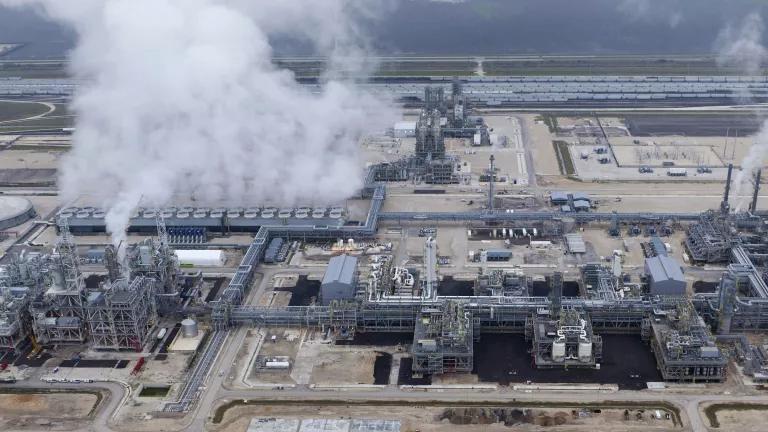VA Pipeline Compressor Station Threatens Nearby Community

The Virginia Department of Environmental Quality (VDEQ) is considering a permit for a compressor station in Buckingham County, Virginia, that would compress natural gas for the Atlantic Coast Pipeline so it can be transmitted farther along the pipeline route. The compressor station slated for Buckingham would be massive, with four large compressor turbines.
Compressor stations are known to emit air pollutants that are harmful to human health, including toxic air pollutants. A recent study of compressor stations in New York State found 70 chemicals that were released, with many linked to multiple categories of human disease. According to the proposed permit for the Buckingham compressor station, it would emit nitrogen oxides (NO2), carbon monoxide (CO), volatile organic compounds (VOCs), sulfur dioxide (SO2), and particulate matter (PM).
Exposure to these pollutants can increase the risk of respiratory, cardiovascular, neurological and developmental diseases. Examples include: eye, nose, and throat irritation, difficulty breathing, worsening of asthma, high blood pressure, heart attacks, and headaches.
The potential health impacts are not limited to the families that live in the shadows of the compressor station. There are also significant regional health threats. When nitrogen oxides and volatile organic compounds combine in the presence of sunlight, they form ground-level ozone, a regional pollutant. Ozone can cause respiratory problems, including worsening of asthma and other respiratory diseases, and cardiovascular effects, including cardiac arrhythmia, heart attacks, and stroke.
Yet the draft permit does not ensure the maximum feasible reduction in nitrogen oxide, nor does it ensure adequate monitoring of nitrogen oxide to ensure compliance with permit conditions. It also uses flawed modeling of emissions of nitrogen oxide and VOCs formaldehyde and hexane. And it lacks an emissions limit for ammonia.
People most at risk from breathing polluted air include people with asthma (or other respiratory diseases), children, older adults, and people who are active or work outdoors. According to the American Lung Association, children face special risks from air pollution because their lungs are growing and because they are so active and breathe in more air for their size than adults. They also have higher rates of asthma.
The air permit being considered for the Buckingham site would require emission controls, but would still allow more than 155 tons per year of total emissions from daily operations. And that does not include fugitive emissions (i.e., leaks), emergency-related emissions, or “start-up” and “shutdown” maintenance activities. In addition, the emission limits are based on average emissions, but limits on average emissions are not necessarily protective of human health as they do not prohibit dangerous spikes that can occur at compressor stations and can lead to health incidents.
In addition to dangerous levels of toxic air pollutants, compressor stations can produce harmful levels of noise. A recent study of homes in West Virginia near a compressor station found that average noise levels for the homes exceeded EPA and WHO recommended limits for both outdoor and indoor noise. Noise is not just a nuisance. It is also linked to serious medical conditions, such as hypertension and heart disease, hearing impairment, communication problems, sleep disturbance, cognitive effects such as memory problems, reduced performance, and behavioral symptoms.
Compressor stations are also a significant public safety risk, and can explode.
The proposed compressor station will introduce these risks to health and safety in one of the most vulnerable populations in the area: the historic, predominantly African-American and economically-disadvantaged communities of Union Hill and Union Hill Grove. Within a one-mile radius of the proposed compressor station are approximately 100 households, and the population is 83% African American, Native American, and Hispanic.
Buckingham County had a majority of African-American residents before and after the Civil War, including many freedmen who had purchased their freedom. Union Hill is being considered for Historic District status by the Virginia Department of Historic Resources and has been listed by Preservation Virginia as a “Most Endangered Historic Place” due to the threats of the compressor station.
In North Carolina, ACP is also proposing to build a compressor station in Northampton County, an area that raises significant environmental justice concerns: a higher African American population, lower median household income, and higher poverty level than the state as a whole; and a higher overall cancer rate. Specifically, lung and bronchial cancers, two forms of cancer linked to air pollutants, are already elevated in the county.
Compressor stations are not benign adjuncts to natural gas pipelines. They present significant public health and safety risks that must all be fully assessed and addressed before permits are considered. In addition, our must vulnerable communities should not become energy sacrifice zones. Unfortunately, VA DEQ has not fulfilled its mission to protect Virginia’s environment when considering this permit. If you are a Virginia resident, please take action here and tell the VA DEQ to reject the proposed air permit for the Buckingham compressor station.




